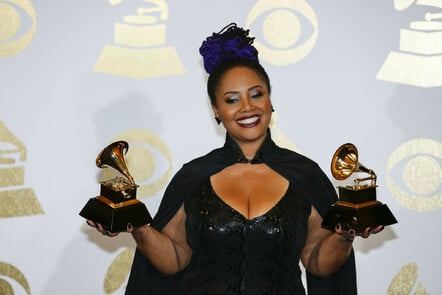New York, NY (Top40 Charts) The Recording Academy announced songwriter Sue Ennis and five-time GRAMMY winner
Lalah Hathaway will lead the Academy's
National Advocacy Committee. Serving as the voice for all music creators in Washington, D.C., working closely with the Academy's Advocacy team, the committee will continue to build on the momentum of the transformative
Music Modernization Act as the landmark legislation approaches its one-year anniversary.
The first order of business for the committee is the Academy's annual District Advocate Day. Taking place on Oct. 2, more than 1,500 music creators nationwide will meet with their members of Congress to push for further protections for artists as part of the largest grassroots advocacy day for music in the nation.
ʺWe are at an inflection point in the music industry,ʺ said Deborah Dugan, President/CEO of the Recording Academy. ʺThe MMA was a giant step forward, and now we need to seal the deal in protecting intellectual property and defending creators against exploitative radio practices. I can't think of a more qualified committee to take on these challenges than this one.ʺ
Sharing seven GRAMMY Awards and 25 nominations among them, the Committee serves as a key conduit to the creative membership. The choice of Ennis and Hathaway to co-chair the Committee demonstrates the Academy's efforts to advance the interests of all creators and provides the committee with a full range of expertise and insight into the process of music creation.
Other Committee members include GRAMMY-winning composer, producer, and singer Claudia Brant; GRAMMY-nominated artist Terry Jones; GRAMMY-winning engineer Emily Lazar; GRAMMY-nominated artist Rico Love; and GRAMMY-nominated producer and songwriter, as well as Chair of the Board of Trustees of the Academy
Harvey Mason Jr. President/CEO of the Recording Academy Dugan and Chief Industry, Government & Member Relations Officer, Advocacy & Membership Daryl Friedman will serve as ex-officio members.
Some of the key issues the Advocacy Committee will take on include:
Encouraging passage of the CASE Act, which establishes a small claims court for copyright cases, including independent artists and songwriters who don't have the unlimited resources needed to protect their work against infringement
Establishing a performance right on terrestrial radio, the only platform in the United States that uses another person's intellectual property without permission or compensation
Encouraging the Department of
Justice to ensure fair compensation for songwriters during its review of the consent decrees that regulate how songwriters are paid
Protecting arts funding to invest in the next generation of music creators
Protecting intellectual property as the United States negotiates and ratifies new trade agreements.
























